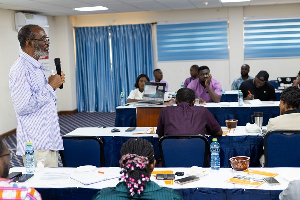 The trainees were charged to dedicate space in the media to avert the corruption menace
The trainees were charged to dedicate space in the media to avert the corruption menace
The Media Foundation for West Africa (MFWA) has trained financial, business, and economic reporters based in the Greater Accra Region on the essence of reporting on Ghana’s extractive sector, including oil and gas flows.
The training, held over two days, aimed to augment the capacity of journalists to develop story ideas on Reserve-Based Lending (RBL) and Illicit Financial Flows (IFFs) to contribute to increasing public access to information on RBL and IFFs and to influence the government's policies on RBL and IFFs.
The capacity-building training, dubbed "Journalist Report on the Impact of Reserve-Based Lending (RBL)," forms part of MFWA's project on the Strategic Partnership Initiative for Ghana and West Africa.
It is noted that "While RBL has significantly reduced financial strain and funded the development of Ghana’s oil and gas industry, it is also susceptible to misuse and serves as a conduit for illicit financial flows (IFFs). Ghana, like other Sub-Saharan African countries with oil reserves, faces increasing vulnerability to corruption when managing oil wealth."
The Programme Director in charge of Media for Peace and Sustainable Development at MFWA, Dr. Kojo Impraim, asserted that Ghanaians are not eager to hold individuals and politicians accountable for the quality of life based on limited or no knowledge of the benefits of the country’s extractive sector.
As part of the effort to increase access to information for the public on the oil and gas sector, he entreated media practitioners to set an agenda of consistent publication on the sector and effectively sustain it.
Dr. Impraim expressed dismay over the two major political parties, the New Patriotic Party (NPP) and the National Democratic Congress (NDC), having absolute control over the airwaves to influence their parties' agendas rather than the interests of the citizens.
He acknowledged that journalists face restrictions from these parties on their ability to independently report on critical matters affecting the country due to the ownership structure and the editorial policies of some media houses.
Dr. Impraim opined that the country is plagued with corruption and misuse of state resources, hence charging the training beneficiaries to dedicate space in the media to avert the corruption menace.
The training equipped the media practitioners with experiential knowledge, contextual ideas, participatory opportunities, and the development of case studies in the oil and gas sector.